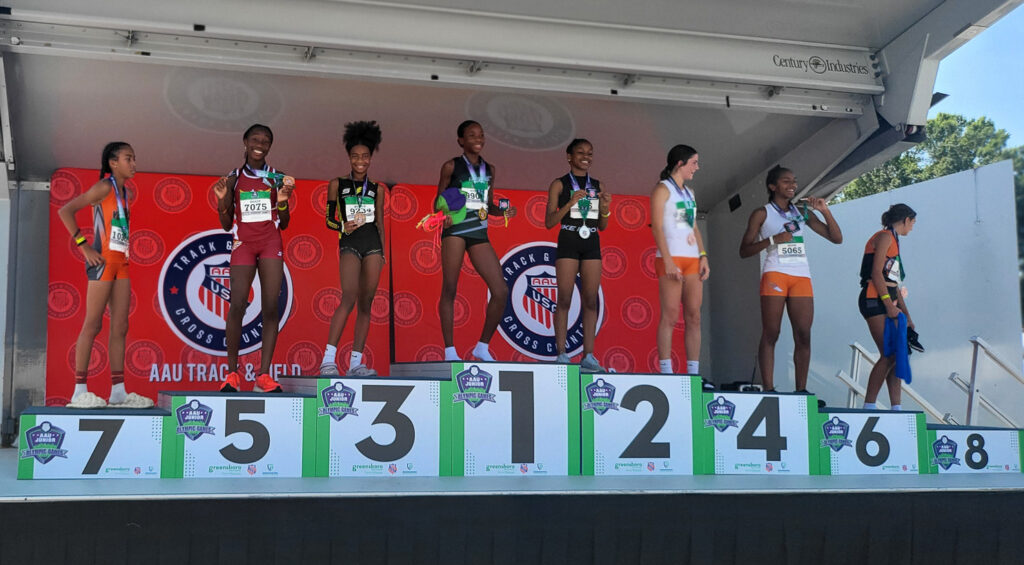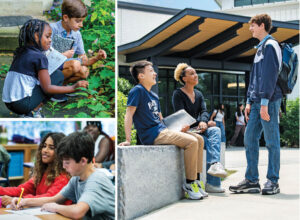Every year, 8,000 track and field athletes in Middle and High Schools across the country converge on a stadium, this year in Greensboro, North Carolina, to compete against one another—and themselves—in the Junior Olympics.
To be invited to compete, students must place highly in multiple qualifiers, involving lots of travel and training. That may be part of the reason Roger Chen ’28, who attended the Greensboro event this past summer, looks almost embarrassed to admit that he only started running a year ago. He’s humble, diligent, keeps his head down, but also fiercely competitive. His other hobbies have similar themes of timekeeping and hard work: He likes puzzles, logic games, and chess—and of course playing video games with friends. But he’s also someone who has loved the outdoors since he was young, and as he’s gotten older, he’s gravitated toward cross country and track—though he does not know which one he prefers yet.
“It’s a tie between outdoor and cross country,” Roger says. “But not because they’re similar—it’s because they’re so different. The track is a flat surface, and you just go around the circle. You’re locked in, there’s nothing else to think about. But then cross country, it’s the opposite: The scenery constantly changes around you, the path might be bumpy, lots of different turns.”
Roger had to go through two rounds of qualifiers in his age-bracket—a top 15, and then a top 5 in his region. In the end, he qualified alongside four other AFS Middle School students—Autumn G. ’30, Auria B. ’30, Gabriel Anderson ’29, and Lucy Byrd ’28.
Like Roger, Auria’s path to the Junior Olympics began a year ago, but she was attached to a more specific goal—to claim the All-American title, awarded to athletes who finish in the top eight in their event. Reflecting on her performance, Auria said, “I was very nervous because I had never made it this far before. It was just a different experience.” She ultimately placed fifth in the 800 meters, achieving her All-American status with a personal record (PR) of 2:19.

This sense of discipline and all-encompassing pursuit of a goal permeates everything Auria does, from studying to playing the clarinet. But competing against others is only part of the picture—what really thrills her is setting a new personal record. “When you run a faster time than you did before, it feels like more than an achievement,” says Auria. “You didn’t just win a race, you beat yourself. You improved. You pushed it further.”
On the other hand, Roger finds a lot of inspiration watching other athletes. “There’s a national record holder from Texas who completed a 5K in just 14:44, and a 1500-meter race in 4:02—and those aren’t even his main events. Sometimes it’s depressing because I might never be at that level, but it’s also motivational. Can I get there if I push myself?” Roger did push himself, ultimately setting PRs in both the 800 and 1500-meter races, finishing the latter in an impressive 4:35.
Reflecting on her own achievement, Auria shares a piece of advice for younger athletes just starting out. “It’s easy to get caught up in the nerves and the rankings,” she says thoughtfully. “I really wanted to be All-American. But the goal should be to push your own limits, because that’s where you really find growth. That’s where you start to feel unstoppable.”
For these AFS athletes, the Junior Olympics has proven to be much more than a competition; it’s been a journey of self-discovery, discipline, and resilience. With each race, they’re reminded that the real challenge isn’t about beating others, but achieving their personal bests. As they look toward the future, they each seem to share the same outlook: their best race is always the next one, and there’s no telling how far they’ll go.


